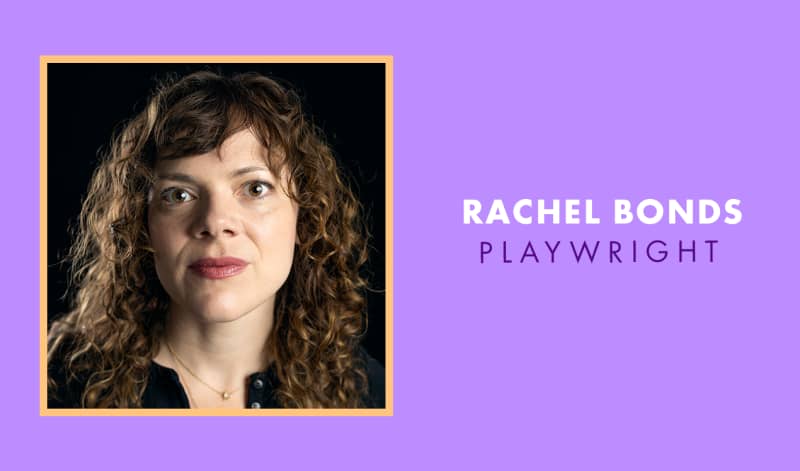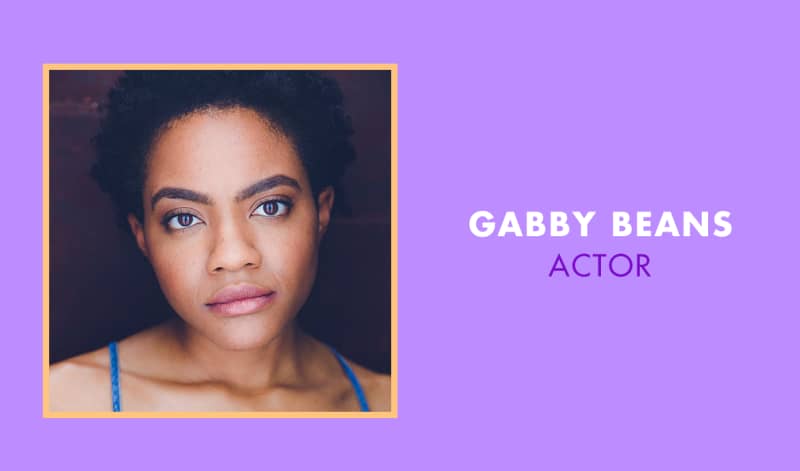Teaching Artists Leah Reddy and Berk Uzman spoke with playwright Rachel Bonds about Jonah.
Leah Reddy: What is your theater origin story?
Rachel Bonds: I am from a tiny college town in the mountains of Tennessee. It's an incredibly beautiful and remote place, surrounded by farmland and small, rural towns. My dad taught at the University, so I had some access to the arts because of our proximity to the college.
This was a one stoplight town. A place where everyone knows everyone. There’s not much to do except be with the trees, meet your friends on their street, tromp through the leaves together. My house was in the woods, surrounded by nature. Beyond taking dance classes, all I did was play outside. I think that environment fostered a very hearty use of the imagination and allowed me to develop a strong story-making muscle.
I also think I grew up feeling a little bit on the outside of things. Maybe I was just naturally an observer, but we were also living in the Bible Belt— and we didn't go to church. My mom's Jewish. It was not a town full of Jewish families. That always set me apart from other kids. Being on the outside of something looking in certainly fostered the writer in me. And then I had parents who loved the arts, and loved books, and loved music. My grandfather was a painter. My sister was a visual artist. My grandmother loved opera. My dad taught Classics—the Greeks! There was always a love of art in my family and an appreciation for the written word.
I think my love for theatre stemmed from who my family was and where I was. The woods feel like a really fertile place for fantasy, and that's where I was for most of my childhood, playing imaginary games with friends and my sisters.
LR: Were there any educational professional experiences that were important to you?
RB: Absolutely. I can think of three in particular.
In Tennessee, there's something called Governor's School that you can apply to as a high school student. It's a summer program that takes place on one of the state university campuses, taught by working professionals in a specific field of study. I got to participate in the Humanities program, where I took a short-story class taught by a real true-to-life writer. It was hugely impactful for me to go and meet all these other kids who were nerds like me, who wanted to be artists, actors and writers, who wanted a big life the way that I did. And to be given access to working professionals in the arts who could mentor us? That was indispensable.
I was always writing and I loved writing, but I also wanted to be an actor. I thought that was going to be my path. I worked incredibly hard in high school and got into Brown, where I wanted to go because everyone I met there seemed well-rounded and curious. They were interested in theatre, but they were also interested in comparative literature or political science. It felt like a place where I could follow all of my interests. Being at Brown was my first experience being around kids who had grown up going to New York all the time. Kids who knew the landscape of the professional theatre, who saw new plays and musicals regularly. Kids with a particular kind of savvy. That was its own kind of education for me. I had gone to the city once with my grandparents when I was 12 and had been completely overwhelmed. We went to see Miss Saigon and we ate lunch in a Starbucks. And it was so much for me. It was so much. I had come from this small, small, small place where everyone knows everyone. Where I knew everyone and everyone knew me—which is of course both wonderful and also terrible. Then to be in a Starbucks in Midtown, the swirling lights and sounds and motion all around us—it was too much for twelve-year-old me. I only felt at ease when we were in the theatre, safely in the dark, where the story could sweep me away.
My dad had been sick for most of my life. I spent a lot of time as a young person taking care of him. He died when I was a sophomore at Brown, which brought both enormous grief and enormous relief. And once that wave crashed into me I found I just couldn't be in school. I could no longer meet deadlines. I could no longer work in a linear way. So I decided to take semester away and do a Solo Performance program at La Mama. This allowed me to write my own work to perform, and to channel my grief into something that might hold it. I certainly couldn’t hold it myself anymore. I had to put it somewhere, and that program gave me space and time and a way forward. Suddenly I found myself in the middle of New York City, alone, away from everyone I knew at school. This time I was ready for the city. Not only ready, but in need of its wild, relentless rhythm. I needed to sink into something and disappear for a few months. With my two fellow classmates I went to see three or four shows a week. We saw Radio Hole and we saw Caroline, or Change. We saw super experimental downtown work, Off-Broadway, Broadway. And I wrote and wrote and wrote, holed up in a tiny room at the 92nd Street Y. I think those few months made me an artist, set me on the path toward who I wanted to be in the world.
LR: What inspired Jonah?
RB: I wrote most of the first draft of Jonah in a fever of five days I stole away from home, away from my toddler and domestic responsibilities, closed in a sunlit bedroom in Upstate New York, gloriously alone for the first time in months.
The seed of the play was planted during the 2016 election, when I was nervously navigating pregnancy for the first time, and The Washington Post released that video of “locker room talk.” It made me think about how much locker room talk I’d swallowed and accepted. How my body had lit up in flames inside, but my mind so quickly brushed it aside. I started to think about how often my body and my mind were separated by these little comments—my mind flying, fleeing somewhere else to protect me. I thought about the stories I would tell myself to keep going, keep walking, to not just explode into a pile of burning ashes on a sidewalk.
During the Kavanaugh hearings, the seed of the play sprouted into a thick, green shoot. I watched as Dr. Ford recounted what had happened to her all those years ago, and I thought about my own sexual history. I realized many of my first sexual experiences were more upsetting than I had allowed myself to understand. I had shaped them and reshaped them to make them seem fine, funny, normal, and if they weren’t, I explained them away by blaming myself. I looked at my husband, a man who I trust deeply. After being hurt by so many men, and not even close to the kind of pain some women have experienced, I asked myself, how have I come to trust this person? How has our intimacy saved me? How could a woman who has been through trauma far worse than mine trust again?
The world has changed a thousand times and a thousand times again since I wrote that first draft. But I continue to return to it. Because it’s a story of deep hurt and survival. About female desire, rage, ingenuity, resilience. About how the thing that hurts you can also save you.
LR: Can you talk a little about your process as a playwright?
RB: Every play is different. They each require different processes. And because I’m a parent, my process also has to shape itself around the ages and needs of my kids. Before kids I'd have a six hour span most weekdays and I could write really effectively for five of those hours. Right now it's more like I get two good hours maybe. Or some days I have 45 minutes and I have to really make the best use of my time.
I usually do what I call writing forward, which for me means I start at what I think is the beginning of a play, whatever comes out, and I just keep going and going forward and I don't look back. I write until I get to an end. And oftentimes I'll get to that end and then realize what the beginning really needs to be, so I'll go back and change it. But I like to write forward and not stop. How much time it takes depends on the play. I wrote most of Jonah in a week. But my play Goodnight Nobody took nine months to come into the world. Every play is its own living, breathing animal with very different needs.
LR: Thinking about how you envision this getting from what you put on the page onto the stage, what do you look for in terms of collaborators?
RB: I'm really collaborative. I really love when everybody's at the table trying to solve things together, not only actors and the director, but designers too. In every production process there has been a moment when a designer has said "Well, what if we did this?" and my brain has exploded. In a good way. Something will unlock and I’ll be able to rewrite a problematic scene because of a smart design choice. I love working with generous artists who are comfortable not knowing the answers, who are open to trying a lot of wrong choices before we find the right one together.
In terms of directors specifically, I look for someone whose work moves me, who is really, really specific about language, and who approaches the work from a place of humanity and generosity. Especially for this play, I wanted to work with somebody who deeply understands the connection between the mind and the body, and who wants to take care of both things. I also have a deep love for actors and want them all to be in an environment in which they feel safe and able to work effectively. Danya shares all of my priorities and I knew from her work that she would direct this show with great sensitivity, elegance, and power.
Berk Uzman: I am writing an Upstage article about translating the more ambiguous stage directions in Jonah. For example, there's scenes in the show where characters get “sucked into darkness” and they re-emerge as someone else. What inspires you to write in those more ambiguous terms? And then how do you collaborate with set designers and lighting designers to bring that to life?
RB: This play operates in a way that many of my plays don't. I think the form fits the content, because we're dealing with someone who has experienced trauma. We're dealing with [the character Ana’s] memory, we're dealing with a mind and body that have been affected by trauma. Things are slippery.
What I've written in the stage directions is a map for how something should feel. Our experience of it should feel elegant, magical, eerie. I think that's what I'm communicating on the page. The designers are helping me figure out how to achieve someone disappearing or someone being sucked out of a room. It's highly theatrical and I don't necessarily know how best to achieve it, but I put the map and the tone in there and then my collaborators will help me make it happen. I don't necessarily feel like every stage direction has to exist exactly as I described. But the feeling of them should be followed.
LR: What advice do you have for new or emerging playwrights? We create this guide for students, but we want to include anyone new to playwrighting.
RB: I think that's really important, especially post-pandemic, when so many people have discovered, "I actually don't want to do this thing I've been doing for the past 20 years. I want to do more fulfilling or rewarding or useful to the world." Or perhaps they haven't been able to fully focus on their writing because they're taking care of a parent, or a child, or their finances haven’t allowed for it. New playwright doesn’t have to mean young in age. It could also mean young in experience.
I would say a few things. One, I think it's great if you can seek out a class to take with someone you really admire and respect. It's a great way to meet other people who are trying to do this work, who are making their own way. That’s a great way to get practice at reading and responding to what other people write. It's a great place to share your struggles with other writers.
Next, I’d say it’s really vital to establish some self-discipline—and I mean something achievable. I don't think it's realistic to say, "I'm going to write 10 pages a day." I mean, maybe, but I think it's better to start with an achievable goal, like, "I'm going to write for 10 minutes every day." Just get into a routine. Find a routine you can repeat, that feels good to repeat. I find writing intensely athletic, it's like a running practice or yoga practice. It’s important to work your writing muscles over and over and over again and pay little attention to the outcome.
Finally, I think having a writer's group, whether that's with an institution like The Public, or Ars Nova, or Page 73, or more casually with a few friends, is a wonderful thing. It’s a great way to find community. Community is really important. Deadlines are really important. Showing up for each other is really important. I know the work I did in Youngblood at EST and in Play Group at Ars Nova made me the writer I am.




